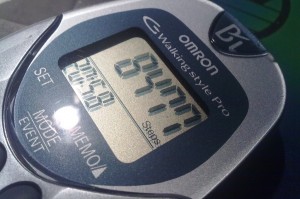Happiness Requires Monitoring
 Happiness requires monitoring. I started to think about this after I forgot my pedometer for a training run the other day.
Happiness requires monitoring. I started to think about this after I forgot my pedometer for a training run the other day.
Dr. Arthur C. Brooks, President of the American Enterprise Institute, says in his “The Promise of Free Enterprise” course at Prager University, “Happiness is earned, not given by others.”
He explains, “Earned success is the satisfaction and happiness that we derive from having dreams and working hard to achieve them.”
So, how do we know whether we have achieved them?
Monitoring tells us what we have achieved.
We Monitor in Many Ways
As runners and walkers, we monitor our progress and achievements in many ways.
- A pedometer tells you how many steps you have taken.
- A mileage log tells you how much distance you have covered.
- How winded you feel tells you about your aerobic capacity.
- How well you sleep tells you about your recovery from fatigue and earlier exercise.
- The tightness of your clothing tells you about the shape of your body.
- GPS readouts tell you your instantaneous and average paces.
- The gap between you and your training buddy tells you about your relative paces.
- A calendar can tell you how well you are sticking to your schedule.
Some of these ways to monitor are quite deliberate. For example, you wear a pedometer for a training session of known distance and then notice at the end how many steps you took. If you took more steps than usual for that distance, then perhaps you shortened your stride, which may have been a goal of yours.
Others of these ways to monitor may be subconscious … at least until you keep some sort of journal about them. For example, I’ve read that some folks are good at maintaining a desired body shape by paying better attention than others might pay to how their clothes fit them. In essence, these folks are more self-conscious than others about about the fit of clothing, and they use how this feels to moderate their diet and exercise.
The Power of Self-Monitoring
Self-monitoring can be more empowering than monitoring by others.
- You decide what you want to monitor.
- You decide why you want to monitor what you will monitor.
- You decide when you want to monitor.
- You decide how you want to monitor.
- You decide whether to change your monitoring.
This sense of control is empowering.
Sharing Is Caring
You can use social media to share your progress, even though you were in charge of what you decided to monitor.
For example, at this writing I’m more than half-way through a month-long “ab challenge” among a group of runners and walkers in a Facebook group. Although I chose to participate in the challenge, I also chose to post a “Done” message every day after completing that day’s challenge. Knowing that others have been tracking my continued engagement in the 30-day challenge has helped to keep me on track.
A Closing Question
So, when you think of the many ways in which runners and walkers — especially marathoners and half-marathoners — monitor themselves, would you say that they tend to be happier than the general population?
And, if so, would you say that this is due in part, if not in full, to all of this monitoring?
Please join the conversation by posting your answer in a comment below. Thank you!